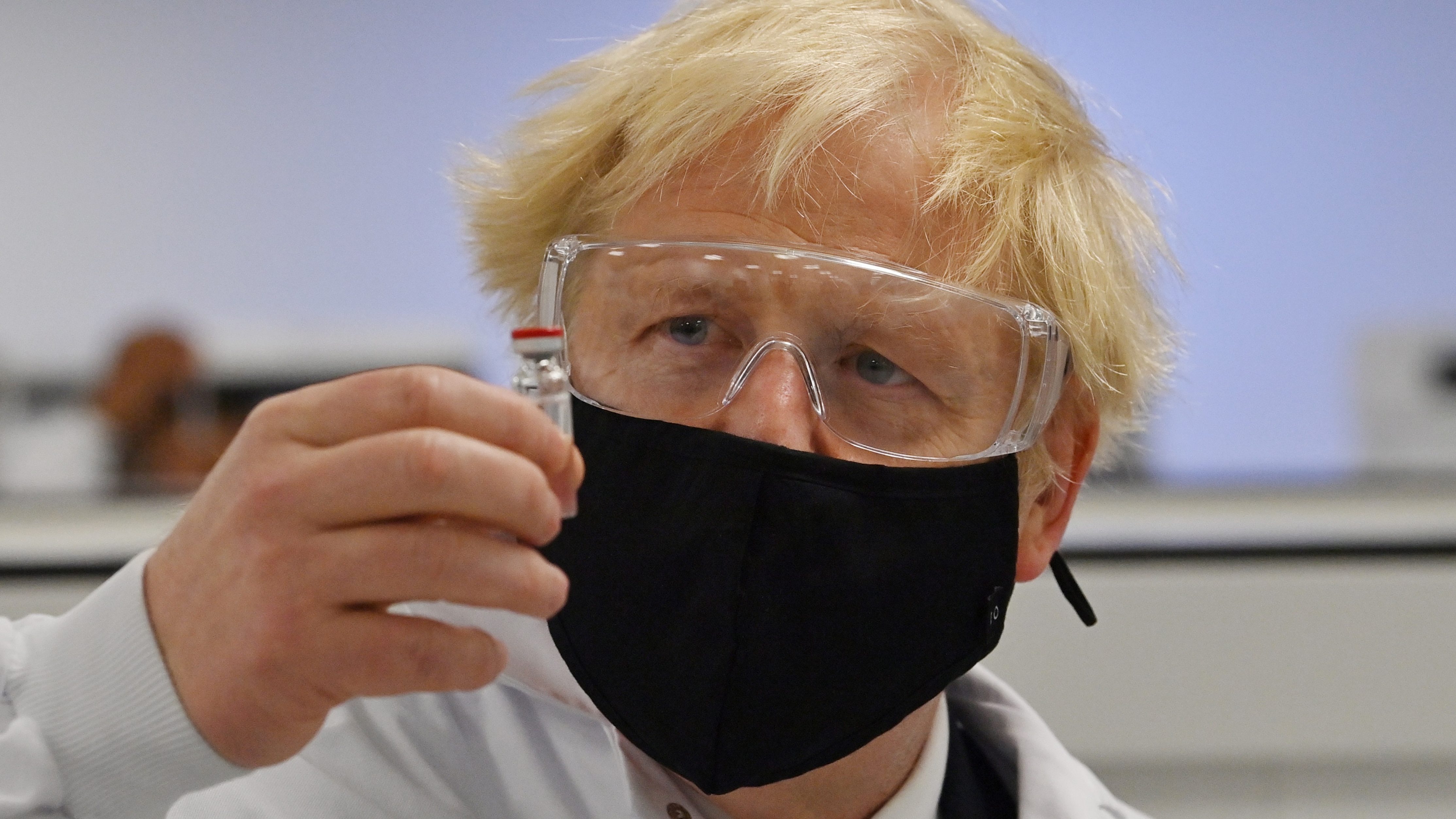Why has the Oxford-AstraZeneca vaccine faced so much scrutiny?
European safety concerns over vaccine remain despite positive data from UK campaign

A free daily email with the biggest news stories of the day – and the best features from TheWeek.com
You are now subscribed
Your newsletter sign-up was successful
Even the most ardent supporter of the government would struggle to deny that the UK’s pandemic response has had its fair share of low points. But in one regard the country has streaked ahead of its neighbours: vaccinations.
The Oxford-AstraZeneca vaccine is the jewel in the crown of the jab rollout that has so far seen over 24 million people receive at least one dose, with plans in place to ramp up to five million jabs every seven days in the coming weeks.
But despite the positive data emerging from the UK, the Oxford University-developed jab has repeatedly faced criticism and suspicion from European nations.
The Week
Escape your echo chamber. Get the facts behind the news, plus analysis from multiple perspectives.

Sign up for The Week's Free Newsletters
From our morning news briefing to a weekly Good News Newsletter, get the best of The Week delivered directly to your inbox.
From our morning news briefing to a weekly Good News Newsletter, get the best of The Week delivered directly to your inbox.
Damaged goods?
A string of European countries, including France and Germany, have suspended the use of the Oxford-AstraZeneca vaccine amid unproven fears the vaccine could trigger blood clots.
The suspensions of the jab came despite both the UK’s regulator and the European Medicines Agency (EMA) saying “that there is no indication that vaccination is linked to thromboembolic events”, the BMJ reports.
Italy, Spain, Germany, France and Cyprus also announced a suspension in the past few days, after Denmark became the first country to halt its use of the vaccine when a 60-year-old woman developed a blood clot and died. Austria, Estonia, Lithuania, Luxembourg, Latvia, Bulgaria, Romania, Iceland, Norway, Sweden, the Netherlands and the Republic of Ireland have also all suspended its use.
A free daily email with the biggest news stories of the day – and the best features from TheWeek.com
BBC health correspondent Nick Triggle writes that “from what has been published so far the chance of a blood clot after vaccination is very low”, adding that “it could be in line with what you would expect to happen anyway – coincidence rather than cause”.
But this is not the first time that European confidence in the Oxford vaccine has been damaged, after Emmanuel Macron claimed in January, on the day the EMA approved the vaccine for use in all age groups in the EU, that it was “almost ineffective” in over-65s.
Days before, German media had also made misleading claims over its efficacy, claiming the AstraZeneca vaccine “had an effectiveness of only 8%” in that age group and attributing the figure to a source in the German health ministry.
Writing on Twitter, The Times’ Berlin correspondent Oliver Moody notes that AstraZeneca’s “strange interim phase three clinical trial data sent it into a bit of a vicious PR circle” in Germany.
In the early clinical trials, “scientists decided not to test the vaccine among large groups of over-65s, until they had plenty of evidence that it was safe in younger people”, the Financial Times reports.
Despite the rollout reducing deaths and hospitalisations in the UK, that “lack of data” was what “led to many European countries advising against its use on older people”, damaging public opinion of the vaccine’s efficacy, the paper adds.
The shortage of data also meant “regulators & vaccine panels have been watching the AZ data like hawks”, The Times’ Moody says. A dispute between the EU and the pharmaceutical giant over “production, distribution and the details of the contract have only made relations worse”, he adds.
Belgium has stood firm on its decision to continue using the Oxford jab, with its most senior virologist, Marc Van Ranst, tweeting that “the side effects of stopping AstraZeneca vaccination are Covid-19 hospitalisations, long-term organ damage from Covid-19, and death from Covid-19”.
But whether other European countries will resume using the jab, and whether they can rebuild public trust, remains to be seen.
Blame game?
“While governments are pulling the plug, most scientists are rolling their eyes”, The Guardian says. “Blood clots are common, but not more common in people who have had a Covid jab, from the evidence so far”.
However, there are also suspicions that “the vaccine is being put on hold for political, rather than scientific, reasons,” Forbes reports.
Citing a report by Barclays looking into AstraZeneca’s regulatory issues in Europe, it suggests that “authorities in certain geographies may have been looking for someone to blame for an initially frustrating rollout”.
Last week, the “fraught” relationship between the EU and UK was further “inflamed” when European Council President Charles Michel accused the UK of imposing an “outright ban” on the export of vaccines, BBC Europe editor Katya Adler reports.
Both Boris Johnson and Foreign Secretary Dominic Raab strenuously denied the accusation. But the prime minister has also not shied away from politicising the UK’s successful vaccine rollout.
Prior to February’s G7 meeting, pundits suggested that Johnson had taken a sly dig at the EU when he urged the bloc to pool its “collective ingenuity” to develop new vaccines to tackle new coronavirus strains. And writing in The Times today, Johnson has moved to position the UK as a leading light in the fight against coronavirus, saying the UK’s vaccination programme has inspired a “new global hope”.
Sorcha Bradley is a writer at The Week and a regular on “The Week Unwrapped” podcast. She worked at The Week magazine for a year and a half before taking up her current role with the digital team, where she mostly covers UK current affairs and politics. Before joining The Week, Sorcha worked at slow-news start-up Tortoise Media. She has also written for Sky News, The Sunday Times, the London Evening Standard and Grazia magazine, among other publications. She has a master’s in newspaper journalism from City, University of London, where she specialised in political journalism.
-
 Quentin Deranque: a student’s death energizes the French far right
Quentin Deranque: a student’s death energizes the French far rightIN THE SPOTLIGHT Reactions to the violent killing of an ultra-conservative activist offer a glimpse at the culture wars roiling France ahead of next year’s elections.
-
 Secured vs. unsecured loans: how do they differ and which is better?
Secured vs. unsecured loans: how do they differ and which is better?the explainer They are distinguished by the level of risk and the inclusion of collateral
-
 ‘States that set ambitious climate targets are already feeling the tension’
‘States that set ambitious climate targets are already feeling the tension’Instant Opinion Opinion, comment and editorials of the day
-
 A Nipah virus outbreak in India has brought back Covid-era surveillance
A Nipah virus outbreak in India has brought back Covid-era surveillanceUnder the radar The disease can spread through animals and humans
-
 Is the US about to lose its measles elimination status?
Is the US about to lose its measles elimination status?Today's Big Question Cases are skyrocketing
-
 Covid-19 mRNA vaccines could help fight cancer
Covid-19 mRNA vaccines could help fight cancerUnder the radar They boost the immune system
-
 Is this the end of ultraprocessed foods?
Is this the end of ultraprocessed foods?Today's Big Question California law and the MAHA movement are on the same track
-
 Can TrumpRx really lower drug prices?
Can TrumpRx really lower drug prices?Today’s Big Question Pfizer’s deal with Trump sent drugmaker stocks higher
-
 The new Stratus Covid strain – and why it’s on the rise
The new Stratus Covid strain – and why it’s on the riseThe Explainer ‘No evidence’ new variant is more dangerous or that vaccines won’t work against it, say UK health experts
-
 RFK Jr. vaccine panel advises restricting MMRV shot
RFK Jr. vaccine panel advises restricting MMRV shotSpeed Read The committee voted to restrict access to a childhood vaccine against chickenpox
-
 RFK Jr. scraps Covid shots for pregnant women, kids
RFK Jr. scraps Covid shots for pregnant women, kidsSpeed Read The Health Secretary announced a policy change without informing CDC officials